Maria Soledad Pera
We're Still Doing It (All) Wrong: Recommender Systems, Fifteen Years Later
Sep 11, 2025Abstract:In 2011, Xavier Amatriain sounded the alarm: recommender systems research was "doing it all wrong" [1]. His critique, rooted in statistical misinterpretation and methodological shortcuts, remains as relevant today as it was then. But rather than correcting course, we added new layers of sophistication on top of the same broken foundations. This paper revisits Amatriain's diagnosis and argues that many of the conceptual, epistemological, and infrastructural failures he identified still persist, in more subtle or systemic forms. Drawing on recent work in reproducibility, evaluation methodology, environmental impact, and participatory design, we showcase how the field's accelerating complexity has outpaced its introspection. We highlight ongoing community-led initiatives that attempt to shift the paradigm, including workshops, evaluation frameworks, and calls for value-sensitive and participatory research. At the same time, we contend that meaningful change will require not only new metrics or better tooling, but a fundamental reframing of what recommender systems research is for, who it serves, and how knowledge is produced and validated. Our call is not just for technical reform, but for a recommender systems research agenda grounded in epistemic humility, human impact, and sustainable practice.
Impacts of Mainstream-Driven Algorithms on Recommendations for Children Across Domains: A Reproducibility Study
Jul 09, 2025


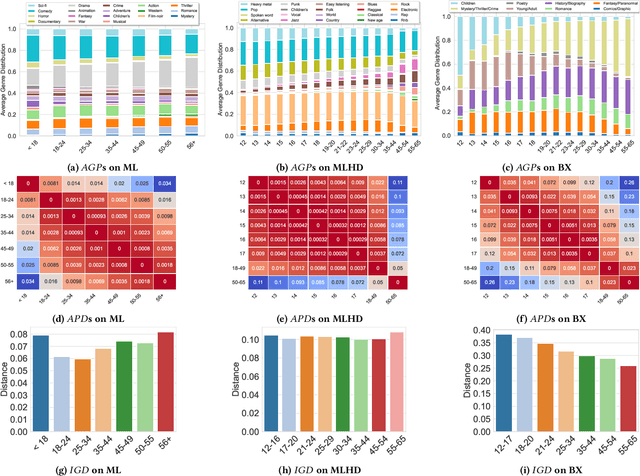
Abstract:Children are often exposed to items curated by recommendation algorithms. Yet, research seldom considers children as a user group, and when it does, it is anchored on datasets where children are underrepresented, risking overlooking their interests, favoring those of the majority, i.e., mainstream users. Recently, Ungruh et al. demonstrated that children's consumption patterns and preferences differ from those of mainstream users, resulting in inconsistent recommendation algorithm performance and behavior for this user group. These findings, however, are based on two datasets with a limited child user sample. We reproduce and replicate this study on a wider range of datasets in the movie, music, and book domains, uncovering interaction patterns and aspects of child-recommender interactions consistent across domains, as well as those specific to some user samples in the data. We also extend insights from the original study with popularity bias metrics, given the interpretation of results from the original study. With this reproduction and extension, we uncover consumption patterns and differences between age groups stemming from intrinsic differences between children and others, and those unique to specific datasets or domains.
De-centering the (Traditional) User: Multistakeholder Evaluation of Recommender Systems
Jan 09, 2025Abstract:Multistakeholder recommender systems are those that account for the impacts and preferences of multiple groups of individuals, not just the end users receiving recommendations. Due to their complexity, evaluating these systems cannot be restricted to the overall utility of a single stakeholder, as is often the case of more mainstream recommender system applications. In this article, we focus our discussion on the intricacies of the evaluation of multistakeholder recommender systems. We bring attention to the different aspects involved in the evaluation of multistakeholder recommender systems - from the range of stakeholders involved (including but not limited to producers and consumers) to the values and specific goals of each relevant stakeholder. Additionally, we discuss how to move from theoretical principles to practical implementation, providing specific use case examples. Finally, we outline open research directions for the RecSys community to explore. We aim to provide guidance to researchers and practitioners about how to think about these complex and domain-dependent issues of evaluation in the course of designing, developing, and researching applications with multistakeholder aspects.
Ah, that's the great puzzle: On the Quest of a Holistic Understanding of the Harms of Recommender Systems on Children
May 03, 2024Abstract:Children come across various media items online, many of which are selected by recommender systems (RS) primarily designed for adults. The specific nature of the content selected by RS to display on online platforms used by children - although not necessarily targeting them as a user base - remains largely unknown. This raises questions about whether such content is appropriate given children's vulnerable stages of development and the potential risks to their well-being. In this position paper, we reflect on the relationship between RS and children, emphasizing the possible adverse effects of the content this user group might be exposed to online. As a step towards fostering safer interactions for children in online environments, we advocate for researchers, practitioners, and policymakers to undertake a more comprehensive examination of the impact of RS on children - one focused on harms. This would result in a more holistic understanding that could inform the design and deployment of strategies that would better suit children's needs and preferences while actively mitigating the potential harm posed by RS; acknowledging that identifying and addressing these harms is complex and multifaceted.
* 7 pages, 2 figures, DCDW 2024
A Multi-Perspective Learning to Rank Approach to Support Children's Information Seeking in the Classroom
Aug 29, 2023
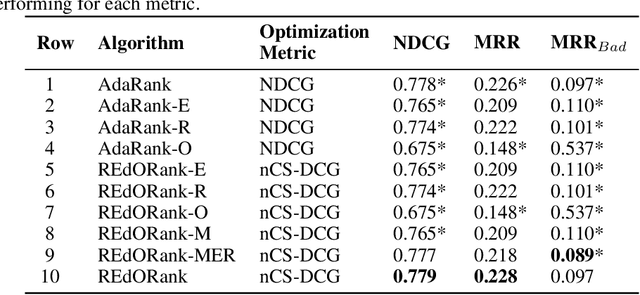

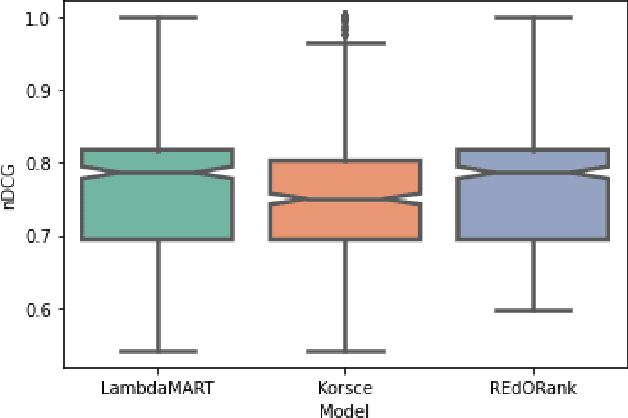
Abstract:We introduce a novel re-ranking model that aims to augment the functionality of standard search engines to support classroom search activities for children (ages 6 to 11). This model extends the known listwise learning-to-rank framework by balancing risk and reward. Doing so enables the model to prioritize Web resources of high educational alignment, appropriateness, and adequate readability by analyzing the URLs, snippets, and page titles of Web resources retrieved by a given mainstream search engine. Experimental results, including an ablation study and comparisons with existing baselines, showcase the correctness of the proposed model. The outcomes of this work demonstrate the value of considering multiple perspectives inherent to the classroom setting, e.g., educational alignment, readability, and objectionability, when applied to the design of algorithms that can better support children's information discovery.
Conversational Agents and Children: Let Children Learn
Feb 23, 2023Abstract:Using online information discovery as a case study, in this position paper we discuss the need to design, develop, and deploy (conversational) agents that can -- non-intrusively -- guide children in their quest for online resources rather than simply finding resources for them. We argue that agents should "let children learn" and should be built to take on a teacher-facilitator function, allowing children to develop their technical and critical thinking abilities as they interact with varied technology in a broad range of use cases.
Matching Consumer Fairness Objectives & Strategies for RecSys
Sep 07, 2022Abstract:The last several years have brought a growing body of work on ensuring that recommender systems are in some sense consumer-fair -- that is, they provide comparable quality of service, accuracy of representation, and other effects to their users. However, there are many different strategies to make systems more fair and a range of intervention points. In this position paper, we build on ongoing work to highlight the need for researchers and practitioners to attend to the details of their application, users, and the fairness objective they aim to achieve, and adopt interventions that are appropriate to the situation. We argue that consumer fairness should be a creative endeavor flowing from the particularities of the specific problem to be solved.
Let's Learn from Children: Scaffolding to Enable Search as Learning in the Educational Environment
Sep 06, 2022Abstract:In this manuscript, we argue for the need to further look at search as learning (SAL) with children as the primary stakeholders. Inspired by how children learn and considering the classroom (regardless of the teaching modality) as a natural educational ecosystem, we posit that scaffolding is the tie that can simultaneously allow for learning to search while searching for learning. The main contribution of this work is a list of open challenges focused on the primary school classroom for the IR community to consider when setting up to explore and make progress on SAL research with and for children and beyond.
Using Conversational Artificial Intelligence to Support Children's Search in the Classroom
Nov 30, 2021Abstract:We present pathways of investigation regarding conversational user interfaces (CUIs) for children in the classroom. We highlight anticipated challenges to be addressed in order to advance knowledge on CUIs for children. Further, we discuss preliminary ideas on strategies for evaluation.
The Impact of User Demographics and Task Types on Cross-App Mobile Search
Sep 14, 2021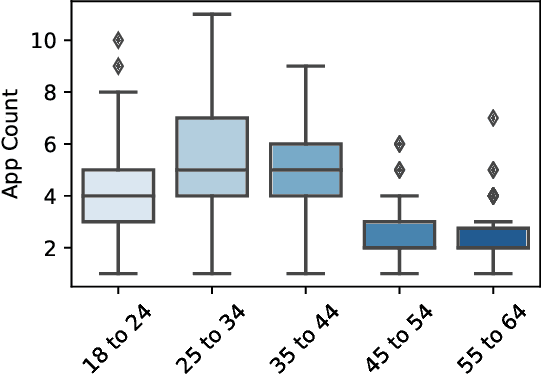
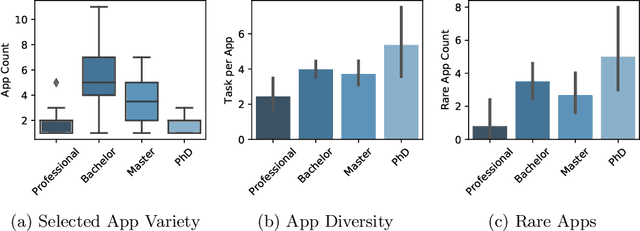
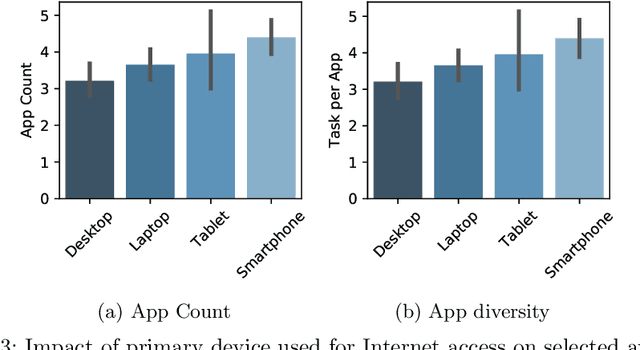
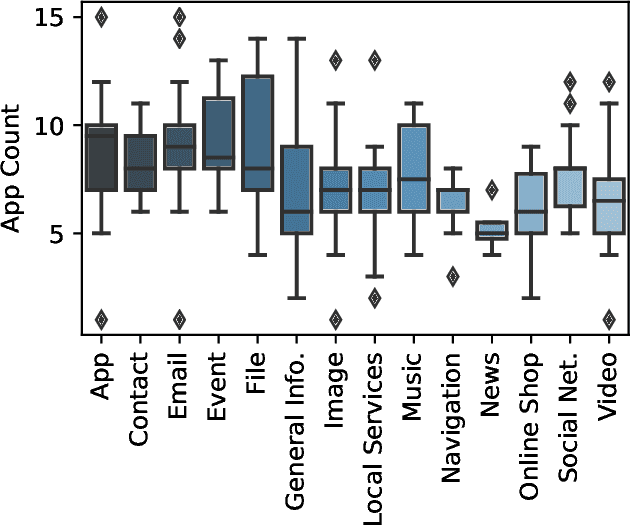
Abstract:Recent developments in the mobile app industry have resulted in various types of mobile apps, each targeting a different need and a specific audience. Consequently, users access distinct apps to complete their information need tasks. This leads to the use of various apps not only separately, but also collaboratively in the same session to achieve a single goal. Recent work has argued the need for a unified mobile search system that would act as metasearch on users' mobile devices. The system would identify the target apps for the user's query, submit the query to the apps, and present the results to the user in a unified way. In this work, we aim to deepen our understanding of user behavior while accessing information on their mobile phones by conducting an extensive analysis of various aspects related to the search process. In particular, we study the effect of task type and user demographics on their behavior in interacting with mobile apps. Our findings reveal trends and patterns that can inform the design of a more effective mobile information access environment.
 Add to Chrome
Add to Chrome Add to Firefox
Add to Firefox Add to Edge
Add to Edge